Game Plan Spread
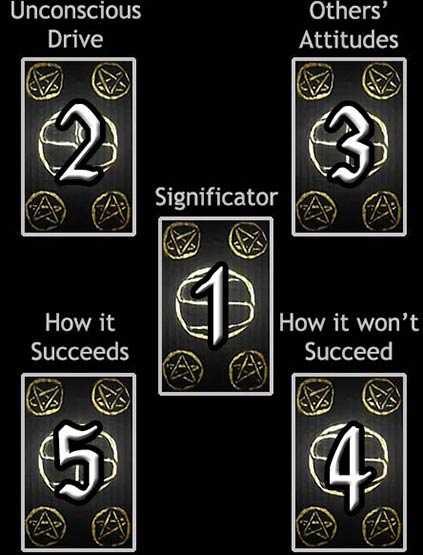
Difficulty: Easy
When a person has a certain plan in mind, this simple five-card spread presents a choice, hinting at what action or attitude should be taken for their plan to succeed, and what should be avoided to help the plan work out for the best.
The initial card is laid in the centre of the layout, the significator. The following four cards are laid out clockwise around the significator.
In this spread, the second card is about what drives the reader, but also says they are not fully conscious of this, perhaps even completely unaware of it. It provides a hint as to the reason they strive for their goal.
The third card uncovers what others think of the reader and their goals. The reader may or may not be aware of this. Sometimes other people factor into the plans (and sometimes they don't).
The fourth card suggests what not to do. If things are permitted to go down this path, the plan will collapse.
The fifth card is a hint as to how to make this plan work out favourably. The idea this card presents should be followed to make the plan successful. It is the differences between Cards #4 & #5 that should be noted, as the differences provide important clues.
Your Game Plan Reading
Unconscious Drive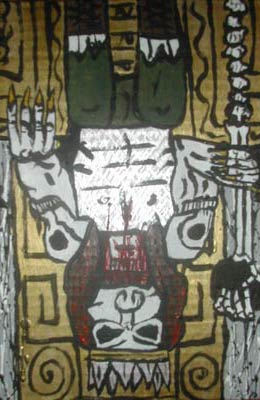 IV. The Emperor |
External Influences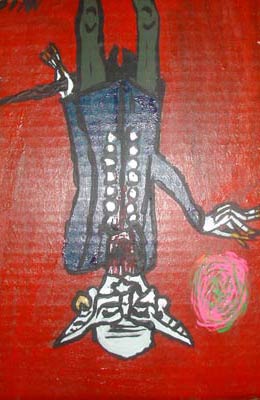 I. The Magician |
|
Significator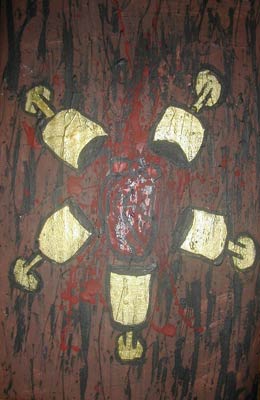 Five of Cups |
||
How it Will Succeed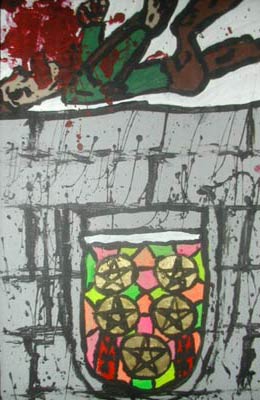 Five of Pentagrams |
How it Will Not Succeed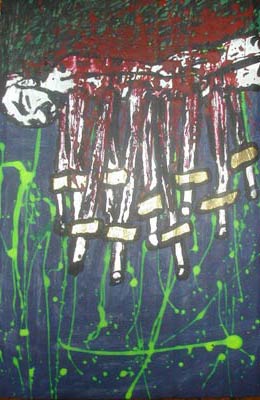 Ten of Swords |

Five of Cups
Symbolism:
Five toppled cups form a pentagram, with something undiscernible at the center. The destruction and loss are apparent, yet the hidden element suggests that something valuable might still remain.
Meaning:
The Five of Cups represents loss, grief, and emotional upset. It suggests the need to process and mourn a loss, be it personal or emotional. This card encourages you to acknowledge your sorrow while being open to healing. It is also a reminder to focus not just on what has been lost but on what remains.
Keywords:
Upright: Loss, grief, sorrow, reflection, healing, emotional challenges.

IV. The Emperor
Reversed
Symbolism:
The Emperor is a Nosferatu seated on a blood-soaked throne, gripping the Hand of Glory as his scepter of authority. His crimson cloak flows like a river of lifeblood, symbolizing his dominion over life and death. Behind him, a craggy fortress rises, representing stability and the structures of power. His stern, commanding gaze reinforces his role as a protector and enforcer of order.
Meaning:
The Emperor symbolizes authority, stability, and protection. He represents the need for structure and discipline to achieve goals and maintain order. As a figure of leadership, he encourages reason and conviction in decision-making. This card often indicates a time to take control of your environment or to rely on a strong, supportive figure for guidance.
Reversed, the Emperor warns of rigidity, tyranny, or a loss of control. It may signify struggles with authority, immaturity, or the misuse of power.
Keywords:
Reversed: Tyranny, rigidity, immaturity, chaos, rebellion, over-control.

I. The Magician
Reversed
Symbolism:
The Magician is depicted as a Nosferatu vampire standing in a commanding pose, a sphere of influence hovering above his outstretched hand. This sphere glows with an otherworldly light, symbolizing his power to manipulate unseen forces. His posture exudes confidence, and the tools of his craft—representing the elements—are subtly embedded in the imagery, hinting at his mastery over earth, air, fire, and water. The shadows around him pulse with potential, representing untapped energy and possibility.
Meaning:
The Magician embodies willpower, creativity, and the ability to manifest one's desires. He is the ultimate initiator, reminding you that you have the power within to transform ideas into reality. This card urges action and focus, calling upon the seeker to harness their innate talents and take charge of their destiny. In situations requiring ingenuity or problem-solving, the Magician assures you that all the tools you need are at your disposal.
Reversed, this card warns of misuse of power, manipulation, or deceit. It may suggest self-doubt, a lack of clarity, or misguided actions that backfire due to overconfidence or ill intentions.
Keywords:
Reversed: Manipulation, deception, power misuse, lack of direction, overconfidence, self-doubt.

Ten of Swords
Reversed
Symbolism:
A male figure lies lifeless, his body pierced by ten swords. The brutality of the scene mirrors the infamous murder of the Black Dahlia, evoking themes of ultimate betrayal and victimization. Blood pools beneath him, symbolizing the depth of his suffering and the irreversible nature of the event.
Meaning:
The Ten of Swords represents total defeat, betrayal, and hopelessness. It signifies the end of a cycle or the culmination of pain, where there is no further descent. Despite its grim nature, the card also holds the promise of new beginnings, as the worst has already passed.
Reversed, this card suggests recovery, triumph over adversity, or the ability to rise again after hitting rock bottom. It reflects newfound strength and the potential for victory through resilience and sheer determination.
Keywords:
Reversed: Recovery, resilience, triumph, power, victory after struggle.

Five of Pentagrams
Reversed
Symbolism:
Outside of the devil's church, a vampire lies in a heap of his own vomit, symbolizing excess, indulgence, and the consequences of material excess. The scene reflects the dangers of overindulgence and losing control.
Meaning:
The Five of Pentagrams represents material loss, poverty, and hardship. It signifies a time of struggle, where one may feel destitute or faced with overwhelming financial or personal challenges. It warns of consequences from reckless decisions and suggests that emotional support or help may be needed to overcome this period.
Reversed, it points to chaos, insecurity, and failed endeavors. It may indicate that the situation is worsened by your own actions or choices, leading to ruin, envy, or bad outcomes.
Keywords:
Reversed: Chaos, ruin, envy, insecurity, wasted opportunities.
